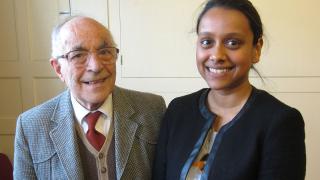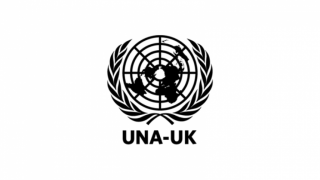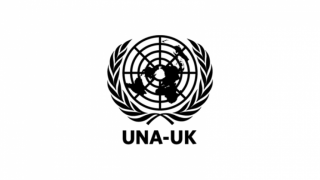
On Saturday 15 February, UNA-UK's Executive Director, Natalie Samarasinghe, addressed members from across the UNA Eastern Region, at a meeting hosted by UNA Saffron Walden branch. She is pictured here with the Branch Chair, Canon Michael Swindlehurst (photo courtesy of UNA member Peter Riding).
The meeting was covered by the Herts and Essex Observer.
A summary of the talk is posted below.
The United Nations – is the glass half full or half empty?
Today I’d like to explore whether the glass is half full or half empty for the United Nations. This question goes to the heart of UNA-UK’s mission. The Association was founded on the promise of the UN, to connect people to its aims. It is crucial that we grapple with its strengths and limitations. Only by doing so can we build a genuine movement for an effective UN in this country.
This morning, I will provide some reflections on the context in which the UN operates, before identifying reasons why we should celebrate its work, and areas where we should push for it to be stronger and more effective. I’ll end with some information on forthcoming UNA-UK initiatives that seek to do just that.
Over the past years, the world has entered a period of growing instability. Many states are increasingly reluctant to look outwards. Public trust has been eroded in financial and political systems. There is a growing disconnect between people, governments and institutions.
Across the world, leaders are struggling to balance economic recovery with political stability, and freedoms with security. The sheer scale and pace of developments has put them on the back foot. Often, inaction seems the safest course. There is also a narrative of gloom, perhaps most visibly in the area of climate change, which has led many people to wonder if, not how, we can address global problems.
Together, these factors have produced a severe deficit in leadership, with the international community increasingly multipolar and polarised. The UN needs to step up and into this vacuum. No other organisation has its reach and remit, nor the legitimacy conferred by its universality.
Before we consider the theme of leadership, let us look at areas where the UN’s work has been, and continues to be, of vital importance.
- The life-saving work of the UN’s frontline agencies
- The UN’s response to disasters
- The essential protection provided by UN peacekeepers
- The UN’s role in setting global standards
- The UN’s impact on international norms and agenda-setting
- The UN’s joined-up approach to global challenges
- The UN’s role as the pre-eminent platform for the world’s countries
But there are also areas where it must do more. Too often, it is unable to respond to pressing situations – Syria is the most obvious and devastating example at present. This inability is linked in part to the perennial constraints of the UN: tensions between member states, the lack of funding, the difficulty to achieve consensus or reform etc. In a way, the UN was set up to under-perform. It has ambitious long-term aims. Member states are simultaneously its board members, shareholders, beneficiaries, donors and implementers. It cannot easily refuse to respond to crises, even when it lacks the resources to address them.
UNA-UK stimulates ideas on ways in which these challenges can be addressed, both incrementally and substantively. But we are aware of the need to focus our reform calls on actual outcomes, not idealistic ones or reform for the sake of it. We must recognise why the Security Council was set up to be the way it is, why the UN system is so decentralised. We must remember those instances where it is able to make headway, despite its flaws.
One area where we think it can and must do more is leadership. The UN should exercise moral leadership. It must speak truth to power. It must use both quiet diplomacy and its bully pulpit. It must do more to capture the public’s imagination and to set the global agenda by speaking out on issues where governments are silent. It needs to engage directly with people, publicise its work, explain its successes and constraints. It needs to foster a true sense of shared responsiblity, a sense that we all have a stake in its work and a role to play in supporting it.
UNA-UK can contribute to these goals by connecting people to the UN and by generating thought, debate and action on its work in this country. Amongst decision-makers, opinion-shapers and the public. We must also push for ways to strengthen its leadership and ability to respond to pressing situations. Two current initiatives we are pursuing are changes to the election process for the Secretary-General and voluntary restraint of the Security Council veto.
Our major UN Forum event will be addressing these and other themes. Above all, it will look at the UN and the UK’s role in tackling the challenges we face, and how we can all contribute to solutions. It will be held on 28 June in Central Hall Westminster in London, site of the first UN General Assembly meeting.
I hope that all of you will join us – book your place today – and that you will support our campaigns over the next months.






